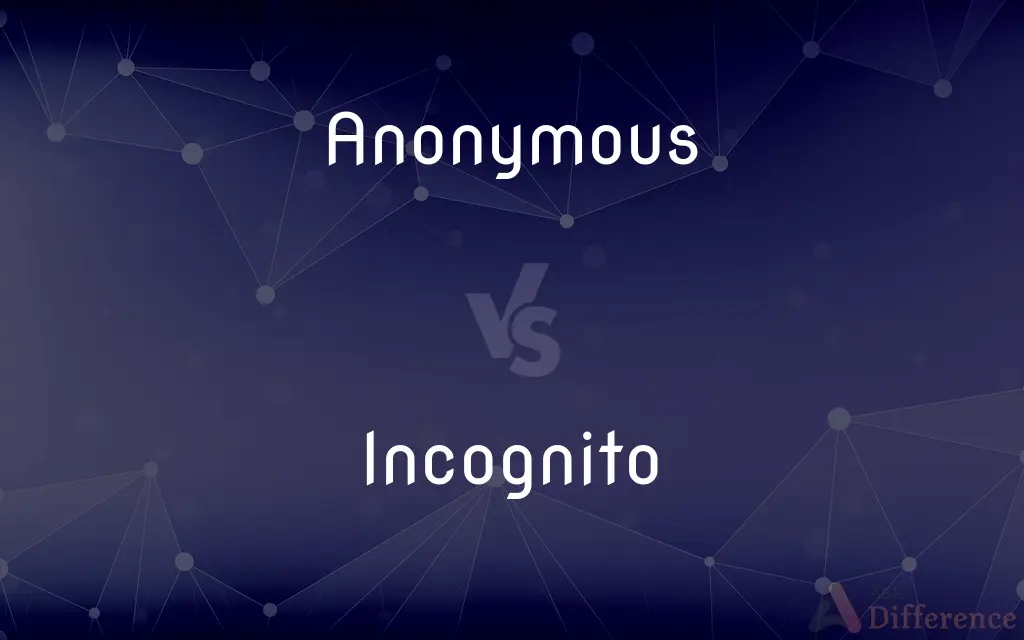Anonymous vs. Incognito — What's the Difference?
Edited by Tayyaba Rehman — By Fiza Rafique — Updated on April 24, 2024
Anonymous refers to hiding one's identity in any activity, while incognito specifically denotes a mode in web browsers that keeps browsing history private.

Difference Between Anonymous and Incognito
Table of Contents
ADVERTISEMENT
Key Differences
Anonymous is a broader term applicable in various contexts where individuals wish to conceal their identity to protect their privacy or for security reasons. Incognito, on the other hand, is specifically used in the context of internet browsing, referring to a private browsing mode that does not save history, cookies, site data, or information entered in forms.
Being anonymous can involve using pseudonyms, wearing masks, or any other method to conceal one’s identity. Using incognito mode in a web browser allows users to browse the internet without leaving a trace on the device used, although it does not hide activity from internet service providers, websites, or network administrators.
Anonymous activities can encompass a wide range of actions, from authoring anonymous posts on forums to making anonymous donations. Incognito browsing, whereas, is specifically aimed at maintaining privacy during web sessions and protecting user information from other users of the same device.
The purpose of anonymity can vary, including personal privacy, protection from retaliation, or freedom of expression without fear of social judgment. The purpose of incognito mode is more technically oriented, designed to prevent the retention of personal browsing data and shield one's online activities from other local users.
Anonymity is a concept that has been important throughout history, seen in literature, activism, and secure communications. Incognito mode, on the other hand, is a relatively modern invention, developed as digital privacy became a concern with the rise of shared and public computing.
ADVERTISEMENT
Comparison Chart
Definition
Concealing one's identity in various activities
A mode for private browsing in web browsers
Scope
Broad, applies to many forms of identity concealment
Narrow, specific to web browsing
Purpose
Privacy, security, freedom of expression
Prevent local storage of browsing data
Tools/Methods
Masks, pseudonyms, encryption
Private browsing mode, VPNs
Impact on Tracking
Can reduce tracking overall
Limits local but not remote tracking
Compare with Definitions
Anonymous
Without any name acknowledged, as that of author, contributor, or the like.
An anonymous letter was sent to the press.
Incognito
Having one's identity concealed.
The celebrity traveled incognito.
Anonymous
Characterized by an unknown or unspecified name.
She prefers to remain anonymous.
Incognito
A mode in browsers for private browsing.
Use incognito mode to avoid saving your search history.
Anonymous
Not identified by name.
Anonymous donors funded the scholarship.
Incognito
Not revealing one's true identity.
He visited the old neighborhood incognito.
Anonymous
Without any name or acknowledgment.
The article was published anonymously.
Incognito
Under an assumed name or identity.
He entered the party incognito.
Anonymous
Lacking individuality, unique character, or distinction.
An anonymous crowd gathered at the concert.
Incognito
The state of being disguised; having a concealed identity.
Agents often work incognito.
Anonymous
Having an unknown or unacknowledged name
An anonymous author.
Incognito
With one's identity disguised or concealed.
Anonymous
Having an unknown or withheld authorship or agency
An anonymous letter.
Incognito
The identity assumed by a person whose actual identity is disguised or concealed.
Anonymous
Having no distinctive character or recognition factor
"They were carried over a bridge above an anonymous parade of shops" (Elizabeth Speller).
Incognito
Without being known; in an assumed character, or under an assumed title; in disguise.
Anonymous
(not comparable) Lacking a name; not named, for example an animal not assigned to any species.
Incognito
Without revealing one's identity.
Anonymous
(not comparable) Without any name acknowledged of a person responsible
An anonymous pamphlet
An anonymous subscription
Anonymous author
Incognito
One unknown or in disguise, or under an assumed character or name.
Anonymous
(not comparable) Of unknown name; whose name is withheld
An anonymous author
An anonymous benefactor
No customer personal data will be retained unless it is rendered anonymous.
Incognito
The assumption of disguise or of a feigned character; the state of being in disguise or not recognized.
Anonymous
Lacking individuality.
An anonymous office block in a soulless industrial estate
Incognito
Without being known; in disguise; in an assumed character, or under an assumed title; - said esp. of great personages who sometimes adopt a disguise or an assumed character in order to avoid notice.
'T was long agoSince gods come down incognito.
The prince royal of Persia came thither incognito.
Anonymous
Nameless; of unknown name; also, of unknown or unavowed authorship; as, an anonymous benefactor; an anonymous pamphlet or letter.
Incognito
One unknown or in disguise, or under an assumed character or name.
Anonymous
Having no known name or identity or known source;
Anonymous authors
Anonymous donors
An anonymous gift
Incognito
The assumption of disguise or of a feigned character; the state of being in disguise or not recognized.
His incognito was endangered.
Anonymous
Not known or lacking marked individuality;
Brown anonymous houses
Anonymous bureaucrats in the Civil Service
Incognito
With your identity concealed
Incognito
Without revealing one's identity;
In Holland he lived incognito as a carpenter in the shipyards of the East India company
Common Curiosities
What does incognito mode do?
Incognito mode prevents the browser from storing browsing history, cookies, site data, or form information.
Is incognito mode completely private?
Incognito mode does not save data locally but does not hide activity from ISPs, websites, or network admins.
How can one maintain anonymity online?
Using pseudonyms, VPN services, and secure browsers can help maintain online anonymity.
Can anonymous activities be traced?
While more challenging to trace, anonymous activities can sometimes be tracked through digital footprints or forensic analysis.
What are common uses for anonymity?
Common uses include protecting personal privacy, avoiding tracking, and ensuring freedom of expression.
Can you be anonymous in incognito mode?
Incognito mode does not make one anonymous to websites or network providers; it only avoids local tracking.
What is the difference between a VPN and incognito mode?
A VPN encrypts internet traffic and hides your IP address, while incognito mode only prevents local data storage.
Why use anonymous communication?
To protect one's privacy, avoid retaliation, or speak freely without judgment.
What are the limitations of anonymity?
Anonymity can be compromised by network surveillance, metadata analysis, and other forensic methods.
What is anonymous?
Anonymous means having or being without any name acknowledged or known.
Does incognito mode hide your IP address?
No, incognito mode does not hide your IP address from websites or your internet provider.
How do you go incognito on a browser?
Most browsers offer an option to open a new window in incognito or private mode through their menu.
Who can still see my activity in incognito mode?
Websites, internet service providers, and network administrators can still see your activity.
How effective is incognito mode in protecting privacy?
Incognito mode is effective for local privacy but not for complete online anonymity.
Why might someone choose to remain anonymous?
For personal safety, to avoid bias or discrimination, or to act without consequences to their identity.
Share Your Discovery

Previous Comparison
Consol vs. Console
Next Comparison
Airfield vs. AirportAuthor Spotlight
Written by
Fiza RafiqueFiza Rafique is a skilled content writer at AskDifference.com, where she meticulously refines and enhances written pieces. Drawing from her vast editorial expertise, Fiza ensures clarity, accuracy, and precision in every article. Passionate about language, she continually seeks to elevate the quality of content for readers worldwide.
Edited by
Tayyaba RehmanTayyaba Rehman is a distinguished writer, currently serving as a primary contributor to askdifference.com. As a researcher in semantics and etymology, Tayyaba's passion for the complexity of languages and their distinctions has found a perfect home on the platform. Tayyaba delves into the intricacies of language, distinguishing between commonly confused words and phrases, thereby providing clarity for readers worldwide.















































